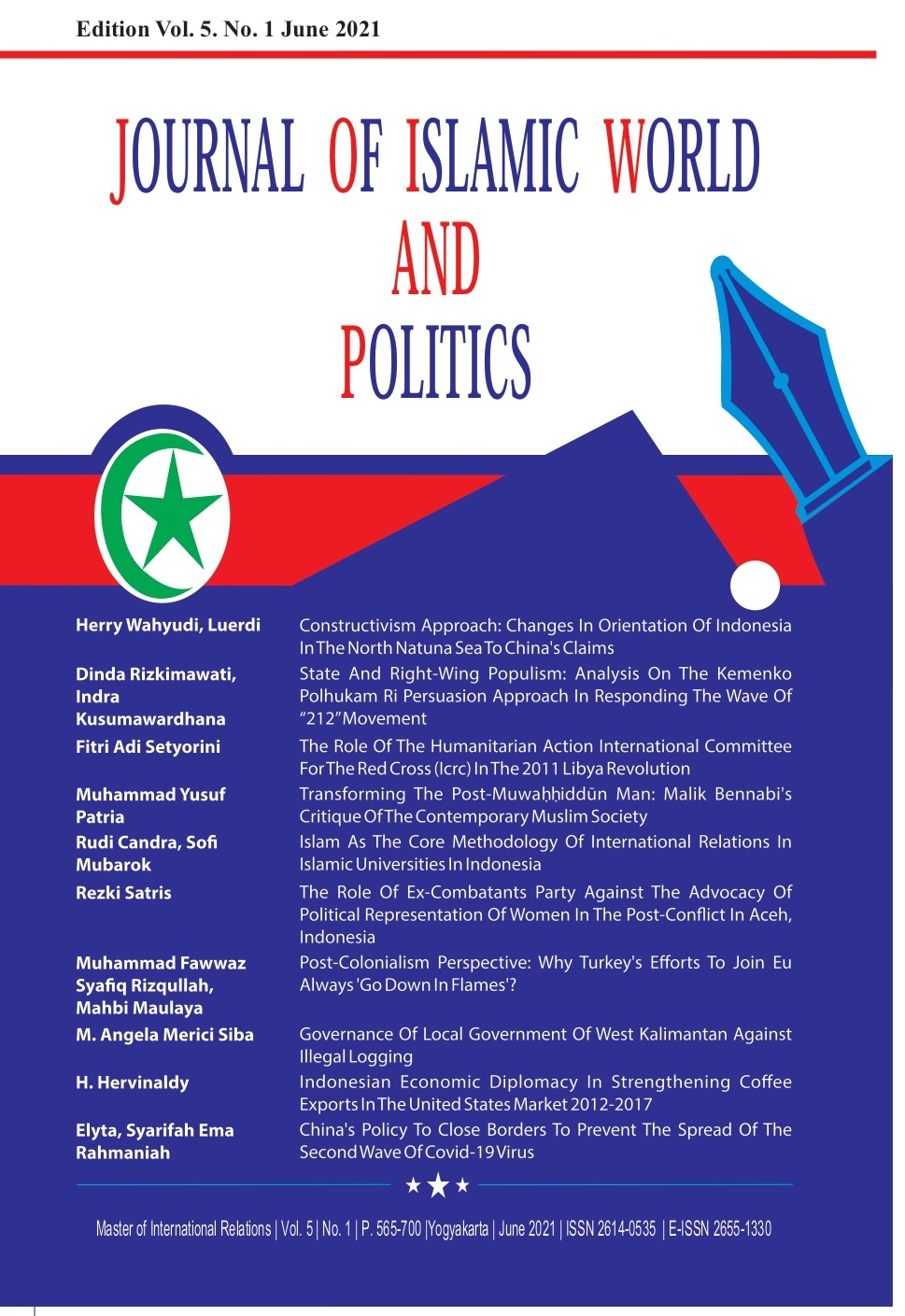GOVERNANCE OF LOCAL GOVERNMENT OF WEST KALIMANTAN AGAINST ILLEGAL LOGGING
DOI:
https://doi.org/10.18196/jiwp.v5i1.7316Keywords:
illegal logging, socialization, policies, the local government of West KalimantanAbstract
Illegal logging is unauthorized logging and timber theft performed by the perpetrators wanting to manage forests for their individual needs. It has a negative impact on the habitat of forests and communities in West Kalimantan. The felled trees are used for the needs of the perpetrators and exported to timber buyer countries. High timber demands have triggered the actors to perform such a crime. It occurs because some actors carry out document forgery in managing forests. This research utilized the political system theory from David Easton and discovered that the local government of West Kalimantan has made illegal logging rules. However, illegal logging remains to exist because the governance from the local government has not been maximized in issuing not binding policies and lack socialization from the government to the community regarding illegal logging.
References
Abdul Halim Barkatullah, D. A. (2016). Tanggung Jawab Pemerintah dalam Menjaga Kualitas Lingkungan di Wilayah Penambangan Intan Tradisional Cempaka. Al'Adl, 1-22.
anonim. (2019, Juli 20). Konflik Kepemilikan Hutan. (M. A. Siba, Interviewer)
Cipto, H. (2016, Agustus 30). Setiap Tahun Hutan Indonesia Hilang 684.000 Hektar. Retrieved Agustus 13, 2019, from Kompas.com: https://regional.kompas.com/read/2016/08/30/15362721/setiap.tahun.hutan.indonesia.hilang.684.000.hektar
Cornelis. (2015, Mei 25). Peraturan Gubernur Kalimantan Barat Nomor Tahun 2015 Tentang Rencana Kerja Pemerintah Daerah provinsi Kalimantan Barat Tahun 2016. Retrieved Maret 24, 2019, from kalbarprov.go.id:
http://kalbarprov.go.id/file/dokumen/renja_renstra/rkpd_kalbar_2016.pdf
Easton, D. (1984). Kerangka Kerja Analisa Sistem Politik. Jakarta: Bina Aksara.
Irawan, Y. K. (2018, Januari 01). Bareskrim Polri Bekuk Bos Illegal Logging di Kalimantan Barat. Retrieved Januari 18, 2019, from kompas.com: https://regional.kompas.com/read/2018/01/19/23490111/bareskrim-polri-bekuk-bos-illegal-logging-di-kalimantan-barat
Malik, H. (2011, April 22). Problematika Penanganan Illegal Logging di Indonesia. Retrieved Agustus 12, 2019, from Kompasiana.com: https://www.kompasiana.com/unik/5500b567a333115b7451181e/problematika-penanganan-illegal-logging-di-indonesia
Narindrani, F. (2018). Upaya Masyarakat dalam Pencegahan dan Pemberantasan Pembalakan Liar di Indonesia. Jurnal Penelitian Hukum DE JURE, 18(02), 241-256.
Nurlinda, I. (2015, Desember). Analisis dan Evaluasi Kehutanan. Retrieved Agustus 23, 2019, from bphn.go.id: https://www.bphn.go.id/data/documents/ae_ttg_kehutanan.pdf
Purba, C. P. (2014). Potret Keadaan Hutan Indonesia Periode 2009-2013. Bogor: Forest Watch Indonesia.
R, M. A. (2017, November 20). Baharkam Polri Gagalkan Illegal Logging di Sungai Landak Kalbar. Retrieved Maret 24, 2019, from Detiknews: https://news.detik.com/berita/3736336/baharkam-polri-gagalkan-ilegal-logging-di-sungai-landak-kalbar
Senjaya, I. W. (2017). Kebijakan Publik Perlindungan Pertanian di Kabupaten Batang: Analisis Teori David Easton. Jurnal Hukum Khaira Ummah, 12(4), 825-832.
Setiono, B. (2005). Memerangi Kejahatan Kehutanan dan Medorong Prinsip Kehati-hatian Perbankan untuk Mewujudkan Pengelolaan Hutan yang Berkelanjutan. Jakarta: Cifor.
Supriad. (2010). Hukum Hutan dan Hukum Perkebunan di Indonesia. Jakarta: Sinar Grafika.
Woy, R. N. (2013). Kewenangan Pemerintah Daerah dalam Upaya Pemberantasan Pembalakan Liar (Illegal Logging). Jurnal Hukum Unsrat, 34-43.
Downloads
Published
Issue
Section
License
License
Journal of Islamic World and Politics is licensed under an Attribution-ShareAlike 4.0 International (CC BY-SA 4.0) license. You are free to:
- Share — copy and redistribute the material in any medium or format
- Adapt — remix, transform, and build upon the material for any purpose, even commercially. This license is acceptable for Free Cultural Works.
The licensor cannot revoke these freedoms as long as you follow the license terms.
- Attribution — You must give appropriate credit, provide a link to the license, and indicate if changes were made. You may do so in any reasonable manner, but not in any way that suggests the licensor endorses you or your use.
- ShareAlike — If you remix, transform, or build upon the material, you must distribute your contributions under the same license as the original.
- No additional restrictions — You may not apply legal terms or technological measures that legally restrict others from doing anything the license permits.
Copyright
Authors who publish with this journal agree to the following terms:
- Authors retain copyright and grant the journal right of first publication with the work simultaneously licensed under an Attribution-ShareAlike 4.0 International (CC BY-SA 4.0) that allows others to share the work with an acknowledgment of the work's authorship and initial publication in this journal.
- Authors are able to enter into separate, additional contractual arrangements for the non-exclusive distribution of the journal's published version of the work (e.g., post it to an institutional repository or publish it in a book), with an acknowledgment of its initial publication in this journal.
- Authors are permitted and encouraged to post their work online (e.g., in institutional repositories or on their website) prior to and during the submission process, as it can lead to productive exchanges, as well as earlier and greater citation of published work (See The Effect of Open Access).

